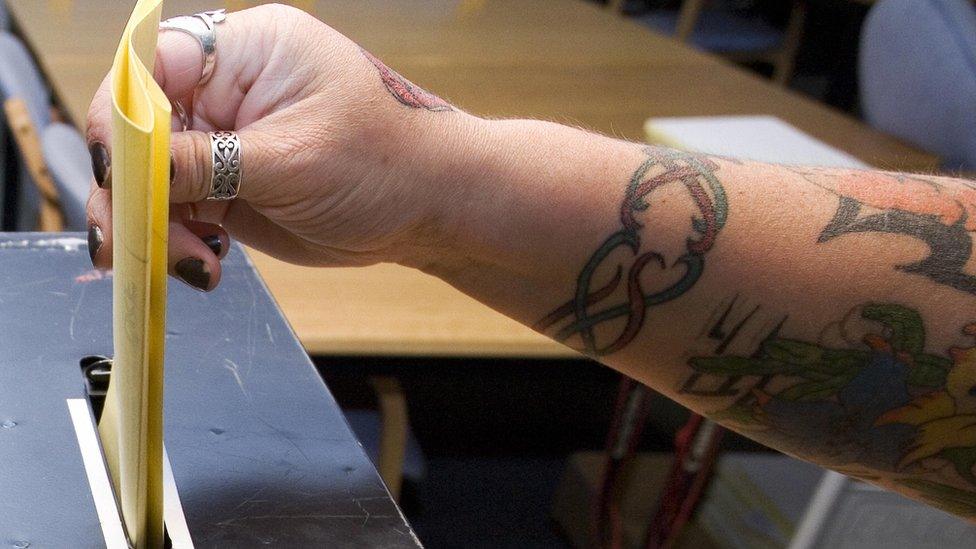Council and mayoral elections: Are they being forgotten?
- Published
- comments
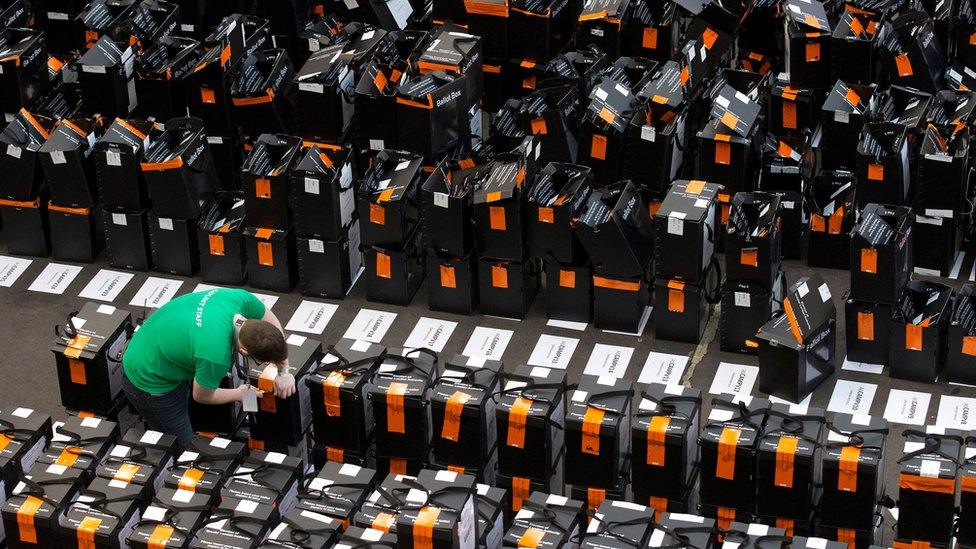
The large turnout in the UK's EU referendum ignited hopes for a similar boost in the local and mayoral elections. But with the surprise announcement of a general election on 8 June, will the local polls get overlooked?
More than a million additional people joined the electoral register in 2016, the year the UK came to a historic decision to break ties with the European Union.
Across the country, the number of people on the electoral roll grew. The largest rise in Britain, for example, occurred in Colchester, where there was a 9% increase in registered voters.
Experts are in no doubt the increase was driven by the referendum. Neil Park, of the Office for National Statistics said it was a "key driver".
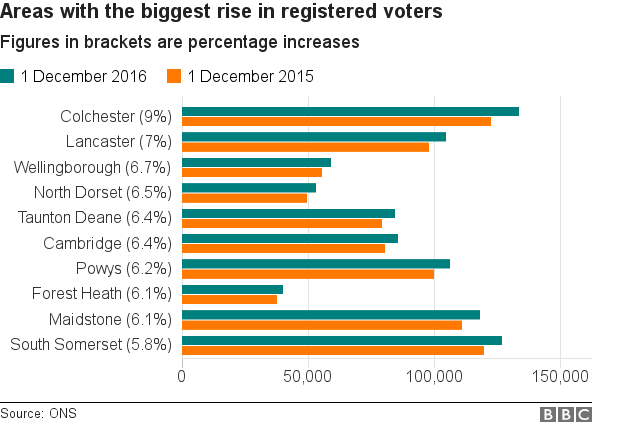
But experts do not expect this new-found enthusiasm for the ballot box to translate to local polls.
Colin Copus, Professor of Local Politics at De Montfort University, said people simply do not see local councils as having sufficient powers to affect their lives.
"I don't expect the EU referendum last year to make much difference to the local election turnout this year as voters are sophisticated enough to know the difference between the two," he said.
"If the local elections were on the same day as the general election I think we'd see a greater turnout but the fact that they're a month apart means we are not likely to see that.
"There's a real danger that because the mayors are a new office that people don't know much about, they will switch off. However, it's really difficult to call this, particularly if the local parties are campaigning hard already and campaign harder still for the General Election."
Sorry, your browser cannot display this content.
The Brexit boost was not apparent everywhere, however. Manchester, where people will be able to vote in the Greater Manchester mayoral election, saw the biggest percentage fall of any area with an election in 2017. There were 14,000 fewer registered voters by the end of 2016 compared with the year before, a drop of almost 4%.
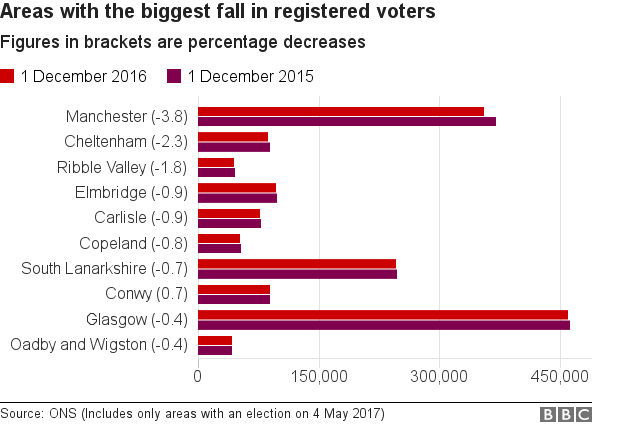
Manchester City Council said it had a high student population, which affected its annual figures.
Turnout in council elections tends to be around a third of registered voters, apart from when there is a general election, when it is around two-thirds.
Other elections or votes taking place on the same day, such as European Parliament, Police and Crime Commissioners or the referendum on the Alternative Vote (AV) have not improved things.
Katie Ghose, chief executive of the Electoral Reform Society, is hopeful of some sort of Brexit bounce.
She said: "We hope the interest built up during the EU referendum does filter through to the upcoming election.
"For the local elections, while council turnout is traditionally low, many authorities are getting more powers, so this vote will have a huge impact on people's daily lives - from rubbish collection to transport and social care.
"While it's positive that most places have seen a rise in numbers on the register, it's slightly ludicrous to have a system that relies on panicked registration surges ahead of once-in-a-generation votes. One would expect people to sign up before major elections - but that's not a stable basis for a registration system."
The number of people registered has also yet to surpass the number who were eligible to voter before the government moved to IER, removing the right of one person in each household to give the names of everyone living there.
In 2014, there were 47.7 million registered voters in the UK. This dropped to 46.2 million by the end of 2015. The figure has now risen to 47.4 million, thanks to the surge in interest from the EU referendum.
Claire Bassett, chief executive at the Electoral Commission, said: "The electoral registers have grown following last year's major electoral events, but we cannot be complacent as millions remain not correctly registered.
"We believe that more automatic registration processes would greatly improve the system, with voters being added to the register after providing their details to other government services. A key example would be the automatic registration of young people when they are issued with a National Insurance number, helping to address historic under-registration of this age group."
Simon Edwards, director of the County Councils Network, said: "Our historic counties are not only important but part of our national identity: that's why it is essential that the 25 million people who live in counties go out and cast their vote."

Elections in Great Britain
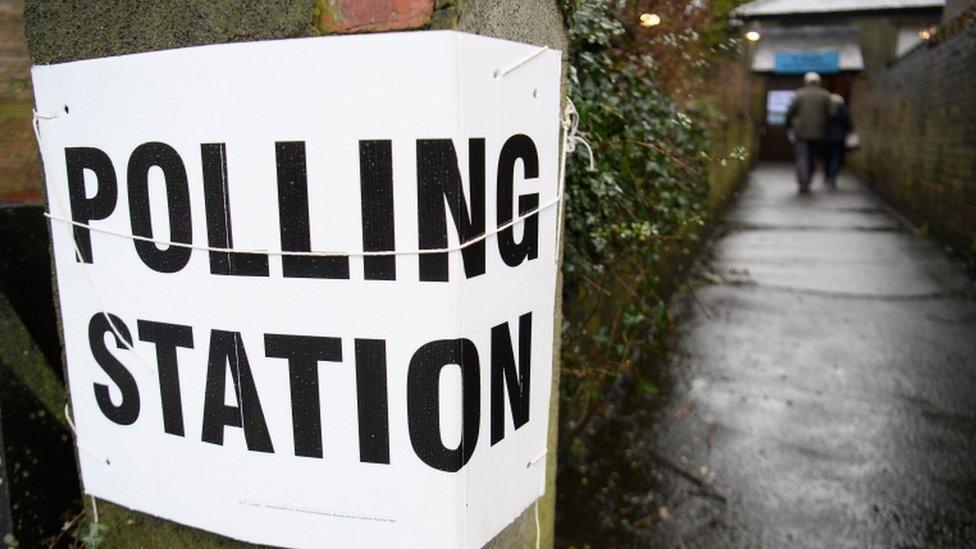
Local elections will be held in 34 councils in England, all 32 councils in Scotland and all 22 councils in Wales on 4 May 2017.
Six areas in England are voting for newly created "combined local authority mayors".
These mayors will mostly be responsible for economic development in their regions, but some will have powers over transport and housing.
Doncaster and North Tyneside are also electing local authority mayors, who are elected leaders of their respective councils.

- Published3 May 2017
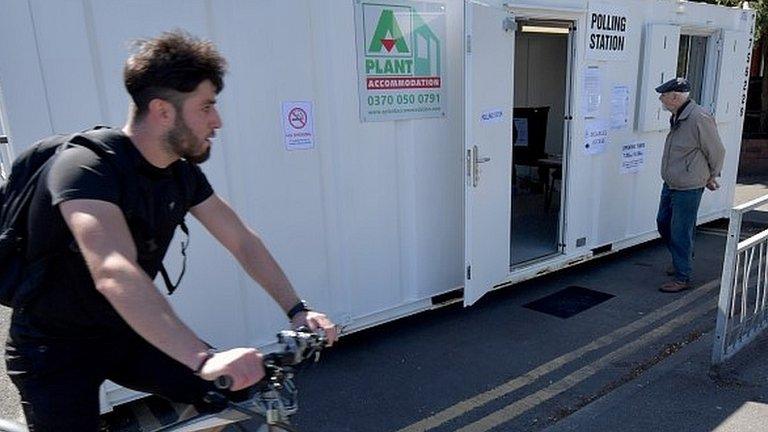
- Published2 June 2017
